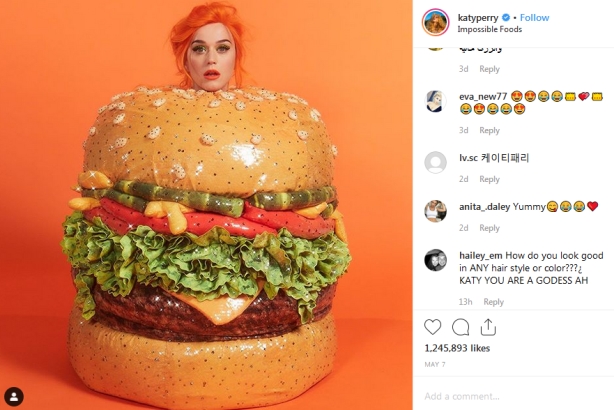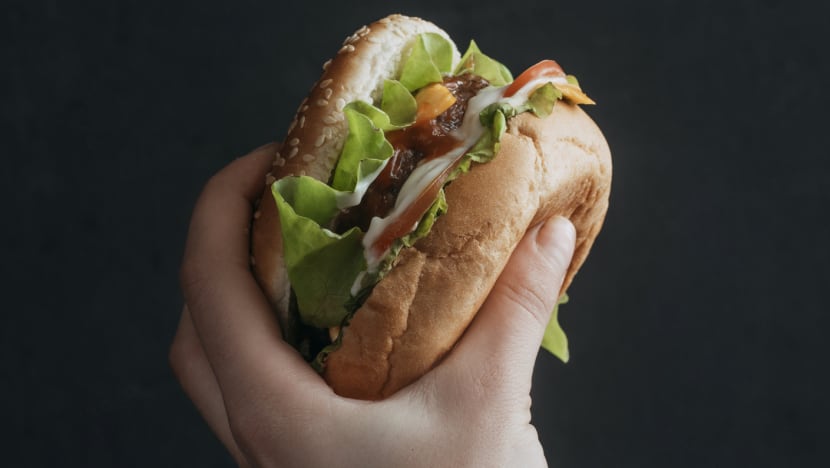Fake meat more unhealthy than real stuff. Sound like a scam from the left wing bleeding heart liberal Fuckwits.
What Is the Impossible Burger and Is It Even Good For You?
Put the two together in the plant-based Impossible Burger, which is made to look and taste like meat, and you have a recipe for a runaway success. The Impossible Burger, which hit grills back in 2016, is now available in about 7,000 restaurants around the country, and quickly
fell into short supply after partnering with
Burger King to create the Impossible Whopper in April of this year. And with more and more runners out there following a plant-based diet like
Michael Wardian or even a vegan diet like
Scott Jurek, we tapped some top nutrition experts to give us the real deal on this fake beef.
What Is an Impossible Burger?
The Impossible Burger was developed to save the Earth, as the parent company Impossible Foods’
mission statement clearly says: “Animal agriculture occupies almost half the land on earth, consumes a quarter of our freshwater, and destroys our ecosystems. So we’re doing something about it: We’re making meat using plants, so that we never have to use animals again.”
Advertisement - Continue Reading Below
To accomplish that mission, the company went to work engineering (literally, the
Impossible Foods team consists of over 100 scientists, engineers, and researchers) a completely vegan burger that looks, smells, and most importantly, tastes like a beef patty hamburger.
What Are the Ingredients in an Impossible Burger?
First, there’s the protein—the essential nutrient in any burger. The original 2016 Impossible Burger was made with texturized wheat protein, which the company
replaced with soy protein concentrate for version 2.0 that launched this past January and served exclusively as of April. The soy swap was designed to deliver a higher-quality protein. It also made the new patty gluten-free, something the company said customers wanted.
Advertisement - Continue Reading Below
Then, the engineering chefs added fats, such as coconut and sunflower oil, to give the burger a juicy sizzle on the grill. They also added fillers and binders like methylcellulose and modified food starch to hold it together, as well as myriad other additives (we’ll get to more on those in a bit) to make the burger look, feel, and taste just right. As you can see, there are a
lot of ingredients that go into mimicking meat:
2019 Impossible Burger Ingredients
Water, Soy Protein Concentrate, Coconut Oil, Sunflower Oil, Natural Flavors, 2 percent or less of: Potato Protein, Methylcellulose, Yeast Extract, Cultured Dextrose, Food Starch Modified, Soy Leghemoglobin, Salt, Soy Protein Isolate, Mixed Tocopherols (Vitamin E), Zinc Gluconate, Thiamine Hydrochloride (Vitamin B1), Sodium Ascorbate (Vitamin C), Niacin, Pyridoxine Hydrochloride (Vitamin B6), Riboflavin (Vitamin B2), Vitamin B12.
Advertisement - Continue Reading Below
The magic ingredient that separates the Impossible Burger from just any garden-variety veggie patty is the heme. Heme is an iron-containing molecule. You find it in hemoglobin in blood and in myoglobin in muscle. It’s what makes blood red and helps carry oxygen around an animal’s body. It’s also what makes meat taste like meat. Turns out plants have it, too.
Impossible Burger found that soy roots contain a compound called leghemoglobin, which also carries heme. By making a patty with soy leghemoglobin, the food scientists found they could infuse a meaty flavor into a plant-based burger.
Advertisement - Continue Reading Below
Problem was that Impossible Foods realized they would need literally an impossible amount of soy to generate enough heme to make their burger business remotely sustainable—or environmentally friendly, which was the whole point. So they figured out a way to genetically engineer it.
In the company’s own words: “We make heme using a yeast engineered with the gene for soy leghemoglobin. First, we grow yeast via fermentation. Then, we isolate the soy leghemoglobin (containing heme) from the yeast, and add it to the Impossible Burger, where it combines with other micronutrients to create delicious, meaty flavor.”
Advertisement - Continue Reading Below
Is the Impossible Burger Healthy?
Environmental issues aside—because unpacking how much healthier an Impossible Burger is for the Earth than a beef burger is another story—are Impossible Burgers healthier for us humans?
Related Story
In a word, “No,” says Elisabetta Politi, M.P.H., R.D., L.D.N., the nutrition director of the Duke Diet & Fitness Center in Durham, North Carolina.
“I don’t think it’s any healthier. As a nutritionist, I tell people that if we want to find a way to address obesity and diabetes, it’s to go back to the way our grandparents ate,” Politi says. “I’m not saying that genetic modification is wrong, but I think it’s disconcerting to make up food. I would not consider this wholesome food because it’s something that has gone through a lot of changes and was created in a lab by the food industry.”
Advertisement - Continue Reading Below
Besides the genetically modified ingredients, it’s not really healthier from a nutritional standpoint either, Politi says, particularly in the realm of saturated fat. Though Impossible Foods lowered the amount of saturated fat in the recent recipe change, it still contains higher amounts than a beef burger.
“An 85 percent lean beef burger, which is what you see in restaurants, has about 6 percent saturated fat,” Politi says. “An Impossible Burger has 8 grams of saturated fat in a four ounce patty, because it contains all that coconut oil.”
Though the health implications of eating saturated fat is a topic of ongoing medical debate,
The American Heart Association still recommends eating no more than 5 to 6 percent of your total daily calories from saturated fat, which is about 13 grams in a 2,000 calorie diet. (Of course regular runners may have higher daily caloric needs, so would have a higher saturated fat allowance, as well.)
Advertisement - Continue Reading Below
As far as the other macronutrients, it also has considerably less protein—29 grams in a beef burger compared to 19 grams in an Impossible Burger—as well as more carbohydrates—0 grams in a beef burger compared to 9 grams in the impossible burger.
The Impossible Burger also has a lot more sodium with 370 milligrams, or about 16 percent of the recommended daily ceiling versus 82 milligrams in a beef burger.
When it comes to vitamins and minerals, the Impossible Burger does have a few benefits that a beef burger does not, Audra Wilson, R.D., L.D.N., C.S.C.S., bariatric dietitian at the Northwestern Medicine Metabolic Health and Surgical Weight Loss Center at Delnor Hospital in Geneva, Illinois, says.
Advertisement - Continue Reading Below
“It has more thiamine, B12, and iron than the beef burger,” Wilson says. “The addition of soy leghemoglobin increases the amount of heme iron in the Impossible Burger, making it a standout among plant-protein sources. The iron typically found in plant-based food sources is non-heme iron, which is not as readily absorbed as the heme iron found in animal food sources,” she says.
The fiber content is another plus. Beef burgers contain no fiber. The Impossible Burger delivers 3 grams, or about 11 percent of the daily-recommended amount, which may help make the Impossible Burger filling and satisfying, despite being lower in protein, Wilson says.
Advertisement - Continue Reading Below
Where Can You Find Impossible Burgers?
Right now, Impossible Burgers are being sold in over 5,000 restaurants in the United States, Hong Kong, Macau, and Singapore with more and more spots adding them to their menus every day. You can find locations
here. Though widely available in restaurants since 2016, the Impossible Burger first appeared in grocery stores this fall, when it
debuted at all 27 outlets of Gelson’s in Southern California. At the end of September, the brand announced availability in 100 Wegmans grocery stores in seven states and at two Manhattan locations of Fairway Market. A 12-ounce package of Impossible Burger costs around $8.99.
The Bottom Line
If you want to eat less meat, the Impossible Burger has some positive attributes. But it’s not necessarily
healthier than a beef burger, because it’s actually higher in saturated fat and lower in protein. It’s also highly processed, which means it’s not necessarily a particularly healthy food in general. But that doesn’t mean it’s unhealthy, either, says Wilson.
Advertisement - Continue Reading Below
“If you are looking to find a replacement for animal proteins in your diet or implement a meatless Monday, this burger may just be the ticket,” she says. “Though it has less protein than beef, as plant protein sources go, it’s a good choice. It also has fiber and nutrients like vitamin B12 and iron.” You may also opt to simply pair it with a high-protein snack like hummus.
If you are watching your carb intake, keep in mind that an Impossible Burger does contribute to your daily carbohydrate count, Wilson says. “Carbohydrates are important for runners so the additional intake may aid in meeting macronutrient goals during training, but others trying to lose weight may find a more carb-friendly protein with animal protein sources.”
Selene Yeager is a top-selling professional health and fitness writer who lives what she writes as a NASM certified personal trainer, USA Cycling certified coach, pro licensed mountain bike racer, and All-American Ironman triathlete.
More From









